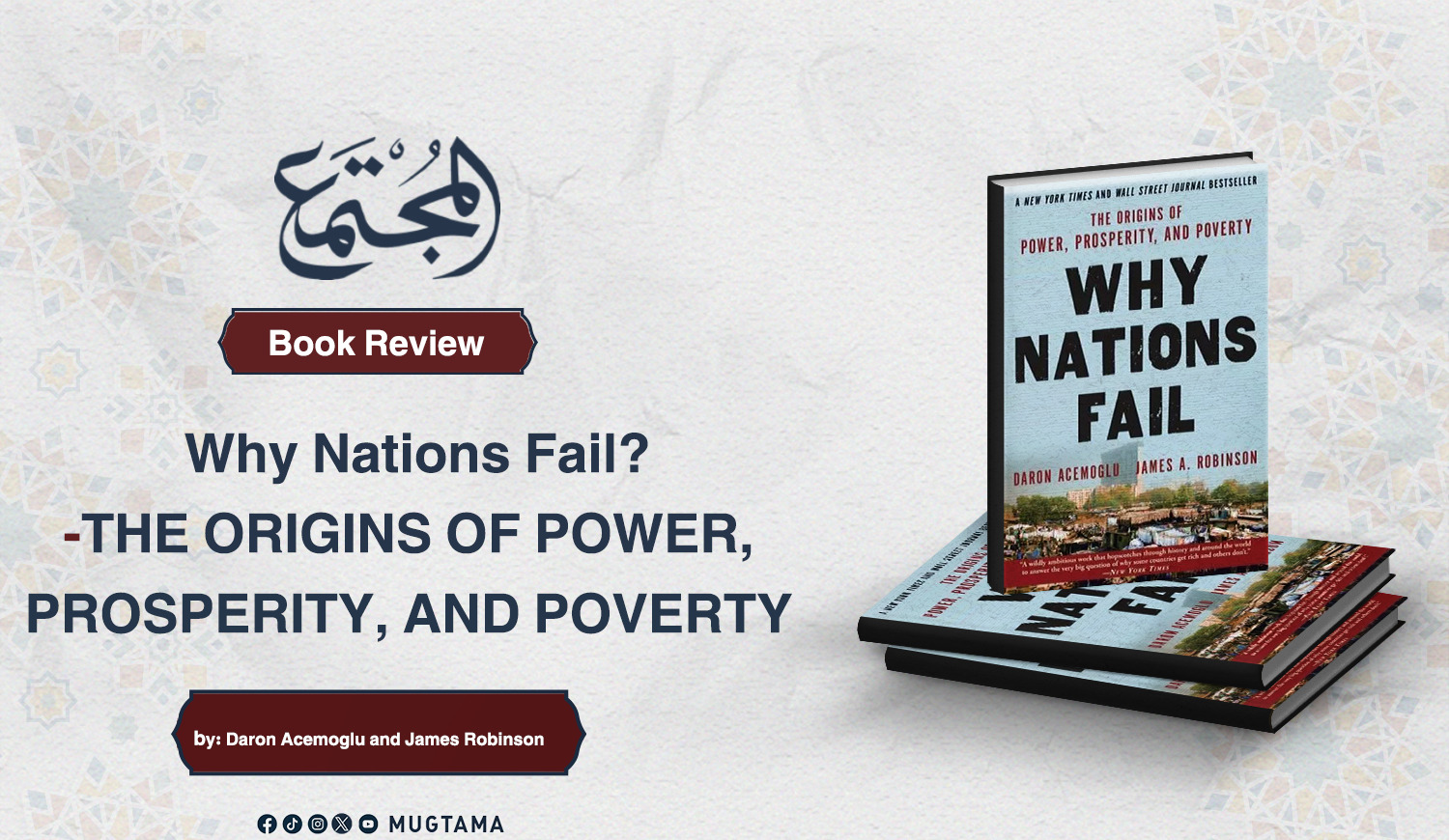Book Review: THE ORIGINS OF POWER, PROSPERITY, AND POVERTY
Why Nations Fail? - by: Daron Acemoglu and James Robinson

Daron Acemoglu and James Robinson's Why Nations Fail? is not merely an academic treatise; it is a profound and engaging exploration into one of humanity's most pressing questions: why do some nations prosper while others remain trapped in a cycle of poverty and instability? After more than 15 years of research and study across continents, Daron Acemoglu and James Robinson present arguments that can contribute to changing many concepts, shaking the certainty of some deeply entrenched traditional beliefs, and even proving them to be misleading.
Faulty Traditional Theories
The authors meticulously debunk what they call "faulty
traditional theories." Acemoglu and Robinson systematically dismantle many
simplistic explanations for the success or failure of nations, such as geography,
culture, and leadership competence. They provide compelling examples to
support their views.
For instance, the divided Koreas—North Korea and South
Korea—share one people and similar geography, yet their economic realities are
entirely different. The second example is Japan's dramatic post-war
transformation, which defies cultural determinism.
Flawed Arguments
The authors assert that blaming a nation's plight on its
climate or the intelligence of a single leader is not merely an
oversimplification, but often a justification for colonial narratives that
exert immense efforts to keep those nations incapacitated, ensuring they remain
raw material reservoirs and markets for the world's dominant powers. Indeed,
colonialism created elites who dominate media and education in these nations,
tirelessly repeating these flawed arguments.
Inclusive Versus Extractive Institutions
The authors' arguments revolve around the concept of inclusive
versus extractive institutions. They emphasize that for any nation to
succeed, it must possess effective inclusive political institutions that
widely distribute power, encompass every corner of the nation and all its
components, excluding no one. These institutions must ensure the application of
the rule of law to all (especially leaders themselves) and foster free
elections and a transparent, independent media.
The authors stress the necessity of creating inclusive
economic institutions that protect property rights, encourage innovation,
provide public services, and allow broad participation in the economy. This
means preventing the concentration of wealth and opportunities in the hands of
a few exploitative climbers, who are often ignorant or foolish. The book
clearly demonstrates how prosperity is fundamentally linked to the quality of
the institutions governing the state, intrinsically tied to the state of the
economy and prosperity.
It further explains that what it calls extractive
institutions—whether political (such as one-party rule or military
dictatorships) or economic (such as monopolies)—lead to national failure. Such
systems, which concentrate power and wealth in the hands of a small, ignorant,
foolish elite—who are the ruler's confidantes and entourage, not people of
knowledge and expertise—stifle innovation, discourage hard work, and ultimately
lead to economic stagnation and collapse, even if temporarily supported by
abundant natural resources, as seen in examples like Venezuela.
Drivers of Change and Transformation
One of the most thought-provoking aspects of the book is its
discussion of how nations change. Acemoglu and Robinson highlight critical
junctures that nations may experience (such as wars or revolutions), which
can drive gradual transformations towards the establishment of inclusive
institutions. However, the authors acknowledge a formidable challenge, even if
nations experience violent upheavals like wars and revolutions: the powerful
influence of the "feedback loop between power and wealth," which
keeps many nations ossified and resistant to change.
In conclusion, Why Nations Fail? presents a strong,
evidence-based argument that shifts the focus, when analyzing the causes of
national failure, from superficial factors to the fundamental institutional
structures that shape a nation's destiny. Therefore, the book is valuable in
its subject matter for researchers, scholars, economists, and anyone interested
in public affairs seeking to understand the root causes of global disparities.
The book provides a compelling framework for analyzing the issue of prosperity
and failure in the past and present. The book is also rich in information,
owing to its academic rigor and extensive studies, yet its central thesis is
clear and simple, making it an excellent contribution to political economy. The
book not only provides an elaborate explanation but also empowers readers to
think critically about the phenomena surrounding them.
-----------------










